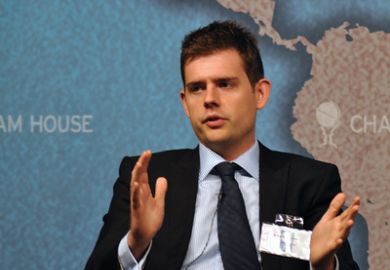UK sector representatives will push the government to development an alternative to the “Champions League of research” if Britain does not associate to the European Union’s next research programme – but fear “a period of discontinuity” when the programme starts in 2021.
Vivienne Stern, director of Universities UK International, made the comments as she gave evidence to a hearing on EU student exchange and research funding programmes held by the House of Lords EU Home Affairs Sub-Committee.
European Research Council grants for outstanding researchers, part of the EU’s framework programmes for research, have been likened to European football’s elite Champions League.
The UK government has said that it wants to join the next EU research programme, Horizon Europe, as an associate member when it starts in 2021, two years after the scheduled Brexit date. But a deal with the EU is yet to be struck.
Ms Stern said that, if the UK should find itself outside the programme, “we would be saying to our government, ‘if you are kicked out of the Champions League, create something even better’.”
She added that “there would be countries who would say…‘we will come in and join you in a new club.’ That would create a prestigious source of research funding open to international competition, perhaps portable on the same basis.”
However, Ms Stern added that it was “highly questionable” whether European nations would wish to join such a research funding scheme given that they would already have access to the EU scheme.
Nevertheless, she said that it was important to engage in “creative thinking” on how to “maintain the UK’s leadership in science through other means” because “we don’t know whether we can associate”.
But Ms Stern stressed that “the clear and unambiguous preference of our sector is to seek full association to the next framework programme”, even if “alongside” there was thinking going on about a “future scenario where that isn’t possible or the terms of association become unappealing”.
Addressing the timescale for potential association to Horizon Europe, she warned that “my real worry is a period of discontinuity”, adding that “we don’t really get to negotiate association to the future programmes until they are finalised – and they are not finalised”.
That means that the UK “probably won’t get into the nuts and bolts” of negotiations on potential association until the “end of this year or some time next year”, Ms Stern continued.
She said: “Is it possible we find ourselves still negotiating association when that programme begins? I think it is possible, because that’s exactly what has happened to Switzerland on a couple of occasions.”
Ms Stern added: “I think we do have to say to people, ‘hurry up.’”
Register to continue
Why register?
- Registration is free and only takes a moment
- Once registered, you can read 3 articles a month
- Sign up for our newsletter
Subscribe
Or subscribe for unlimited access to:
- Unlimited access to news, views, insights & reviews
- Digital editions
- Digital access to THE’s university and college rankings analysis
Already registered or a current subscriber?








